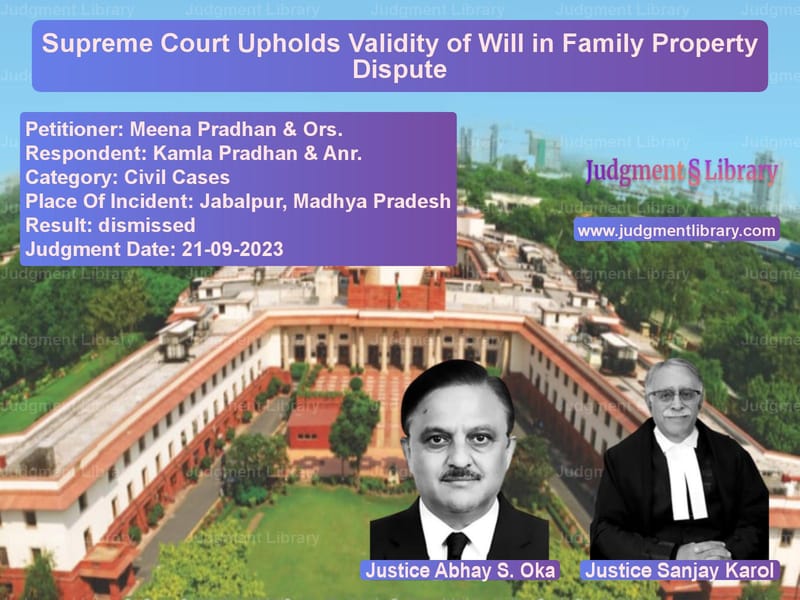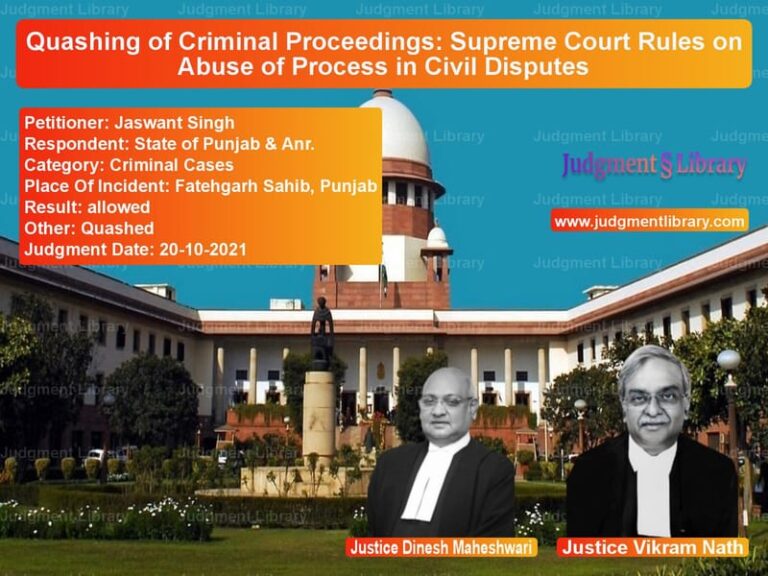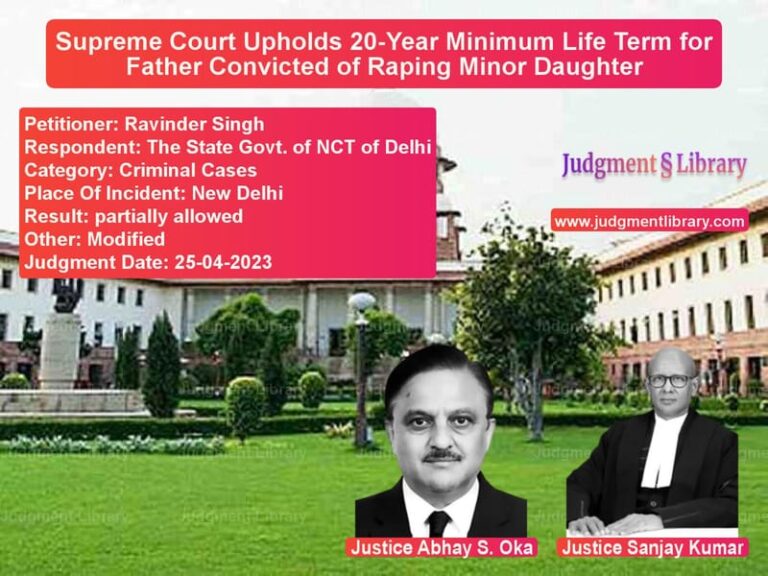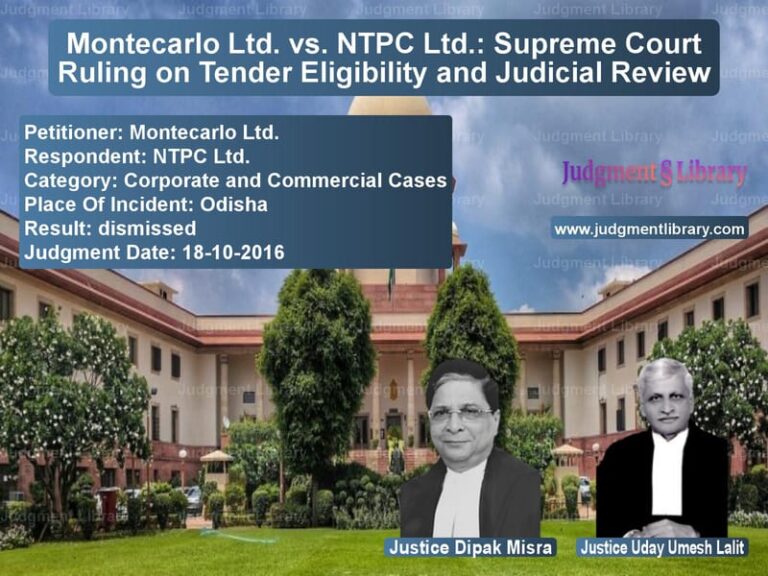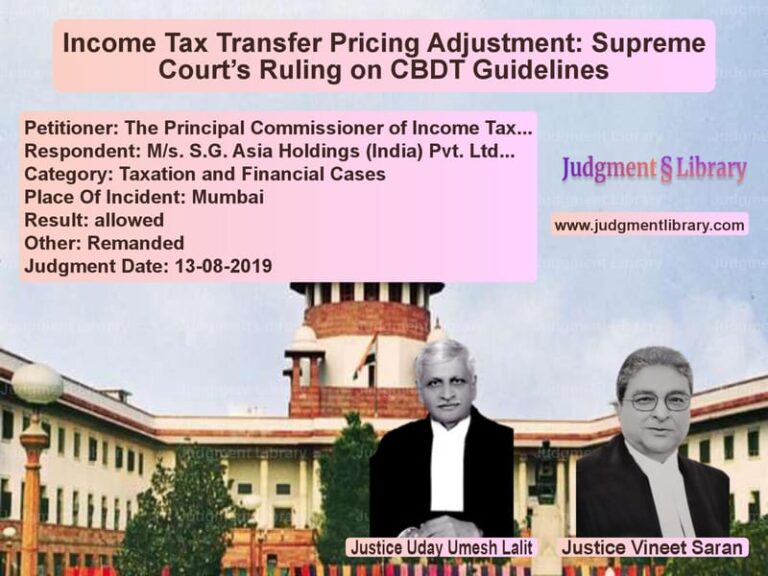Supreme Court Upholds Validity of Will in Family Property Dispute
The Supreme Court of India recently adjudicated on a contentious family dispute involving the validity of a will executed by Bahadur Pradhan. The case, Meena Pradhan & Ors. v. Kamla Pradhan & Anr., revolved around allegations of forgery, bigamy, and legal succession rights. The Court ultimately upheld the will’s validity, emphasizing the importance of procedural compliance and the absence of suspicious circumstances.
Background of the Case
The dispute arose from the execution of a will by Bahadur Pradhan, who allegedly divorced his first wife, Meena Pradhan, and married Kamla Pradhan, with whom he had a child, Ku. Ritu. Seven days before his death, he executed a will on July 30, 1992, in the presence of two witnesses. Following his demise, legal battles ensued over succession rights.
Chronology of Legal Proceedings
- Kamla Pradhan obtained a succession certificate in her favor from the VI Additional District Judge, Jabalpur, on July 5, 1995.
- This order was overturned by the Madhya Pradesh High Court on November 17, 1995, which ruled that the will’s authenticity should be determined through separate proceedings.
- Subsequently, Kamla Pradhan initiated probate proceedings under Section 276 of the Indian Succession Act, 1925.
- The Civil Court, Jabalpur, upheld the will’s validity and issued letters of administration on December 11, 2001.
- The Madhya Pradesh High Court affirmed this decision on March 25, 2010, dismissing objections raised by Meena Pradhan and others.
Legal Issues Before the Supreme Court
The Supreme Court had to decide:
- Whether the will was executed as per the requirements of the Indian Succession Act, 1925.
- Whether the testator was in a sound state of mind while executing the will.
- Whether any suspicious circumstances surrounded the will’s execution.
- Whether allegations of bigamy affected the case’s outcome.
Petitioners’ Arguments
Meena Pradhan and her children argued:
- The will was a forged document created to deprive them of their rightful inheritance.
- The testator was not in a fit mental state to execute the will.
- Kamla Pradhan’s marriage to Bahadur Pradhan was illegal due to his prior marriage, making her claim to the will invalid.
Respondents’ Arguments
Kamla Pradhan and her daughter countered:
- The will was executed lawfully in the presence of attesting witnesses.
- The testator was of sound mind and voluntarily signed the will.
- All legal formalities under Section 63 of the Indian Succession Act were complied with.
- The issue of bigamy was irrelevant to the validity of the will.
Supreme Court’s Analysis
The Court examined the case under the framework of the Indian Succession Act, 1925, and the Indian Evidence Act, 1872.
1. Compliance with Section 63 of the Indian Succession Act
The Court emphasized that a valid will must:
- Be signed by the testator.
- Be attested by at least two witnesses.
- Reflect the testator’s intent to distribute his assets.
Since the attesting witness, Suraj Bahadur Limboo (PW-2), testified that the testator signed the will in his presence, the Court found the execution valid.
2. Proof Under Section 68 of the Indian Evidence Act
As per Section 68, at least one attesting witness must testify to prove a will. The Court held:
“The attesting witness should speak not only about the testator’s signatures but also that each of the witnesses signed in the testator’s presence.”
The testimony of PW-2 satisfied this requirement.
3. Absence of Suspicious Circumstances
The Court noted that a will should be free from doubt or undue influence. It rejected the petitioners’ allegations, stating:
“There is no evidence on record to conclude that the deceased was not in a fit mental condition at the time of execution of the will.”
4. Allegations of Bigamy
The Court refused to entertain arguments about the testator’s alleged second marriage, stating:
“The issue of bigamy is not a relevant factor in deciding the main lis, which is confined to the validity of the will.”
Supreme Court’s Judgment
The Supreme Court dismissed the appeal, holding that the will was duly executed and valid. It directed that the consequential benefits be disbursed accordingly.
Implications of the Judgment
This ruling has far-reaching implications for succession law:
- Strict Adherence to Legal Requirements: The judgment reinforces that wills must comply with the Indian Succession Act and the Indian Evidence Act.
- Role of Attesting Witnesses: Courts rely heavily on the testimony of attesting witnesses to determine a will’s validity.
- Dismissal of Non-Relevant Issues: The Court clarified that allegations unrelated to a will’s execution (such as bigamy) should not affect probate proceedings.
Conclusion
The Supreme Court’s ruling in Meena Pradhan & Ors. v. Kamla Pradhan & Anr. is a landmark decision reaffirming the sanctity of wills in India. By upholding procedural rigor and dismissing extraneous allegations, the Court has reinforced the importance of legally sound estate planning. This judgment sets a precedent for future disputes over testamentary succession.
Petitioner Name: Meena Pradhan & Ors..Respondent Name: Kamla Pradhan & Anr..Judgment By: Justice Abhay S. Oka, Justice Sanjay Karol.Place Of Incident: Jabalpur, Madhya Pradesh.Judgment Date: 21-09-2023.
Don’t miss out on the full details! Download the complete judgment in PDF format below and gain valuable insights instantly!
Download Judgment: meena-pradhan-&-ors.-vs-kamla-pradhan-&-anr.-supreme-court-of-india-judgment-dated-21-09-2023.pdf
Directly Download Judgment: Directly download this Judgment
See all petitions in Succession and Wills
See all petitions in Property Disputes
See all petitions in Judgment by Abhay S. Oka
See all petitions in Judgment by Sanjay Karol
See all petitions in dismissed
See all petitions in supreme court of India judgments September 2023
See all petitions in 2023 judgments
See all posts in Civil Cases Category
See all allowed petitions in Civil Cases Category
See all Dismissed petitions in Civil Cases Category
See all partially allowed petitions in Civil Cases Category

